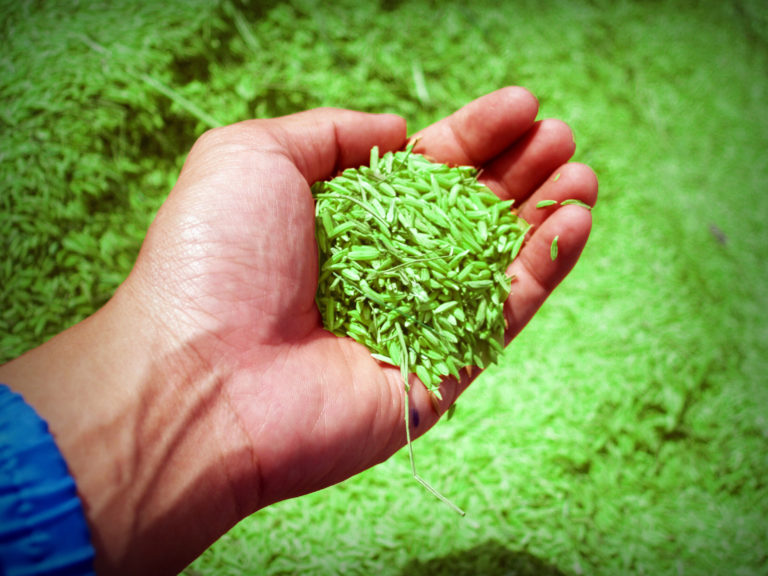Perhaps you have already heard of special grass mixtures made for lawns which use robotic mowers, and wondered what was so special about them. Well, I’ve taken a closer look at them and I’ll explain to you what these special lawn mixtures are all about.
So, what do these special robotic mower grass mixtures do? Grass mixtures for robotic mowers are specially adapted for being maintained by robotic mowers. The types of grass used grow particularly densely and with a short height, in order to reduce the risk of tangling due to cut grass. They also make particularly good use of the nutrients made available by lawn mulch.
Does it therefore make sense to change over to grass mixtures specifically formulated for use with robotic mowers? What exactly is so special about these mixtures? I will clarify that in this article.
Contents
Why Should You Use Special Grass Mixtures for Robotic Mowers?
The Demands of the Lawn on Robotic Mowers
Robotic mowers put different demands on the lawn than regular lawn mowers, because they mow differently in many different ways. Not only do they mow much more often, namely every one or two days, but the lawn is mulched at the same time. This means that only the very tip of the blades are cut off at the top, which then lands as lawn mulch among the grass and decomposes slowly so that the nutrients can be used by the lawn again.
The nutrients from the lawn mulch can only be used to a limited extent by most types of grass. Therefore, it does not replace fertilization in any way, but merely reduces the amount of fertilizer needed. If you stop fertilizing altogether, you will soon find a lot of weeds in your lawn.
At the same time, the load on the lawn is greater, especially in corners and bottlenecks, and also on steeper slopes, as the robotic mower often travels back and forth or the wheels sometimes spin. Even if you have a garage for your robotic mower, you may have noticed that the lawn has bare patches in some places and the ground is a bit churned up due to the constant driving in and out.
The following special features therefore apply to lawns that are mowed with a robotic mower:
- Very frequent cutting of the grass
- Lawn remains constantly cut short
- The resulting lawn mulch used as partial fertilizer
- Lawn mulch that is too long risks become tangled and thatched
- High stress to the grass due to frequent driving, especially in individual areas
What Are the Advantages of Using Special Grass Mixtures for Robotic Mowers?
Special lawn mixtures for robotic mowers aim to eliminate problems that can arise when using a robotic mower, and to make better use of certain advantages that are offered by frequent mowing.
Improved root growth – frequent mowing can stimulate the root growth of the grass. Grass mixtures specifically formulated for use with robotic mowers are particularly created for this purpose and tend to produce very strong and broad root growth when mowed frequently. This provides a higher shear strength (resistance to physical stress) and a more vital lawn through improved water and nutrient absorption.
More growth in width and less in height of the individual grass plants – The selected varieties of grass mixtures for robotic mowers have particularly pronounced blade width and short vertical growth. This ensures a short, and at the same time, dense lawn. A constantly shortly-trimmed lawn therefore still appears very thick. At the same time, less lawn mulch is produced, which reduces the risk of the lawn becoming matted, even if slightly too much time passes between mowings. Last but not least, the enhanced growth in width makes it more difficult for weeds to spread.
Better utilization of nutrients from lawn mulch – Not only due to the above-mentioned broader root growth can the nutrients of the lawn mulch – especially nitrogen- be better utilized by the lawn. Grass varieties that can utilize a particularly large number of the nutrients contained in the lawn mulch are also used, because they can derive the greatest possible benefit from these nutrients.
Control of grass weeds – Although frequent mowing and mulching makes it harder for many weeds to gain a foothold, this actually allows the grass to grow stronger and thicker. However, for certain low-growing, wild grass species that you don’t want in your lawn, known as weeds, the mulching system can become a seeding machine and spread the seeds of foreign invaders. For this reason, lawn mixtures for robotic mowers add special varieties that make it particularly difficult for foreign wild grasses to settle, as they virtually occupy their niches. These mixtures include, for example, Bluegrass and Kentucky Bluegrass.
So to summarize the advantages of using these special robotic mower mixes once again:
Practical experience to date has shown that special robotic mower lawn mixtures actually provide a better lawn appearance in many gardens. So when you lay out a new lawn, it makes sense to consider using a special lawn mixture for robotic mowers.
Are There Other Grass Mixtures That Are Suitable for the Use of Robotic Mowers?
In principle, a robotic mower can be operated on almost any lawn. However, there are certain mixtures, apart from the robotic mower lawn mixtures, which are particularly suitable.
Other grass mixtures that are not special robotic mower mixtures can also be particularly suitable for robotic mowers. Sports turf in particular can be very suitable, as it has similar characteristics, such as high robustness and strong width growth of the grass plants.
Special playing turf can also be suitable, as this also has a certain durability. If you want to lay a new lawn anyway and you have a robotic mower or want to buy one, it is definitely a good idea.
Should I Use Specific Grass Mixtures for Robotic Mowers?
So should you be using a robotic mower-lawn mixture now? That depends. Actually, it only makes sense if you are just about to lay a new lawn and you don’t have an ornamental lawn (because you need different grass mixtures for that).
If your lawn has problems with a lot of weeds or does not look nice for some other reason, it is rarely because the lawn is unsuitable for robotic mowers. Robotic mower lawn mixtures can result in a much better lawn appearance and if you want to redo your lawn to have a great, beautiful, well-maintained lawn, such a special mixture can of course be worthwhile.
It all depends on your standards. If you are satisfied with your current lawn and before you read this article, have not really thought about reseeding the lawn, I would keep the old lawn for now. If at some point there are other good reasons to reseed the lawn, perhaps because it has dried out in a particularly hot summer and has not been properly watered, I would resort to a robotic mower lawn mixture.
The optimized mixture alone would not, in my opinion, justify a new sowing if everything is fine with the previous lawn, but if you are planning to reseed the lawn anyway, then use a special robotic mower mixture. It also makes sense on new plots that do not yet have a lawn, where a robotic mower is to be used in the future.
Related Questions
What do I have to take into account for new seeding with robotic mowers? When new seed is sown, the robotic mower should not be used for mowing at the beginning. The grass must first grow to a height of 4 inches after sowing. Then it should be mowed down slowly with a conventional mower to stimulate width growth of the grass plants, whereby a maximum of 1/3 of the length should be cut off per pass. No cuttings should be left lying around during this phase, as they impair the growth of the young lawn. Depending on the variety, you can use the robotic mower again after one (turbo seed) or several weeks.
08/20/2020
Recent Content
Are you looking to buy a robotic lawn mower? I think there has never been a better time, since the most recent models on the market are actually quite sophisticated so that it can now be appealing...
High-end robotic lawnmowers can be a significant investment, so I was curious about how often they get stolen and did some research on the topic. Although there is no specific data available on...

